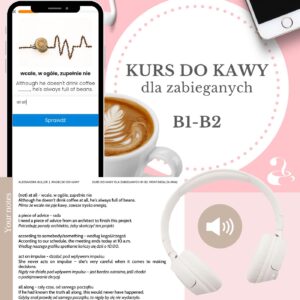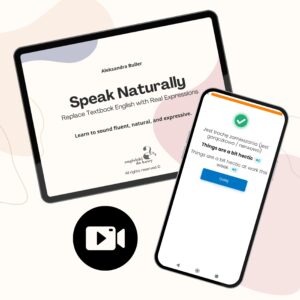Transcript of my podcast episode (23)
This is the 23rd episode of ENGSPRESSO. It’s also the first episode in 2023, so I’d like to say Happy New Year to you, my dear listener! I wish you lots of joy and effortless progress on your way to fluency in English. This year, just like last year, I’m going to help you to stay motivated so that you can boost your English skills and not feel too lonely in achieving this goal. I hope that now learning English is not just your New Year’s resolution but also a good habit that’s already in your blood.
I bet you sometimes wonder how I manage to keep recording these episodes for you without giving up. Well, honestly speaking, I don’t always feel like creating new episodes, especially when I have no idea what I’d like to tell you in the introduction part! But every time I finally make myself sit in front of my laptop and start typing out my transcript, somehow a new episode always comes to life, and it’s not as time-consuming as I think it will be. So my conclusion is that at first it may seem to be difficult to start doing something, but once you start it, it turns out that it’s suddenly easier, and you just finish it. Magic? I guess we just forget what we’re capable of!
So now it’s time to finally learn another two expressions!
The first one is CONTRARY TO APPEARANCES. If something happens contrary to appearances, it happens contrary to what things look like or seem to be. This expression may not be that obvious to you, so let’s hear it in some context.
For instance: Contrary to appearances, the standard of living in this country is quite high. Now, repeat after me.
The translation is: Wbrew pozorom standard życia w tym kraju jest dość wysoki.
Another example: Contrary to appearances, the education system hasn’t changed too much over the years.
Wbrew pozorom na przestrzeni lat system edukacji nie za bardzo się zmienił.
The second expression is FAIR ENOUGH. We use this expression to show that we understand why someone has done or said something. A synonymous phrase could be simply 'ok, fine’, or 'all right’.
For instance: Fair enough, I understand he’s in trouble now, but it’s not our fault.
W porządku, rozumiem, że ma teraz kłopoty, ale to nie nasza wina.
Another example: You can quit this job, fair enough, but you can’t stop looking for a new one!
Możesz odejść z tej pracy, zgoda, ale nie możesz przestać szukać nowej!
And now it’s time for your ENGSPRESSO to go!
Our context for the phrases is:
Fair enough, that wasn’t her best concert, but contrary to appearances, she’s one of the best singers in the world!
Zgoda, to nie był jej najlepszy koncert, ale wbrew pozorom jest jedną z najlepszych piosenkarek na świecie!
Well done! You’ve just completed one more English lesson with me. If, however, you feel that it’s not enough, and you’d like to have a chance to repeat more such English phrases after me, check out my audio course KURS DO KAWY dla zabieganych B1-B2: powtarzaj za mną! which you can find in the shop on my website angielskidokawy.pl. And if you’re looking for the transcript of this episode, you’ll find it on the main page of my website.
Have a great beginning of 2023! Thank you for today and talk to you soon!
Wyświetlanie 10–18 z 20 wynikówPosortowane według najnowszych
-

KURS DO KAWY (B1-B2): Powtarzaj za mną! – kurs audio
45,00zł Dowiedz się więcej -
Promocja!

Zestaw kursów do kawy (B1-B2): kurs audio „Powtarzaj za mną!” + kurs fiszkowy
Pierwotna cena wynosiła: 100,00zł.89,00złAktualna cena wynosi: 89,00zł. Dowiedz się więcej -

IRREGULAR VERBS (Past Simple & Present Perfect) – kurs online A2-B1
45,00zł Dodaj do koszyka -

Transkrypcja odcinków ENGSPRESSO (1-30) – e-book
25,00zł Dodaj do koszyka -

ENGSPRESSO – kurs online
35,00zł Dodaj do koszyka -

245 IDIOMÓW, PRZYSŁÓW I POWIEDZEŃ (part 2) – kurs online
45,00zł Dodaj do koszyka -

Lekcja indywidualna (A2-C1)
149,00zł Dodaj do koszyka -

EVERYTHING ABOUT AUTUMN – kurs online
39,90zł Dodaj do koszyka -

Webinar „Speak Naturally” + e-book + kurs fiszkowy
59,00zł Dowiedz się więcej




